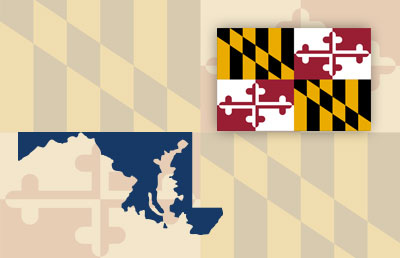Maryland Updates: Foreclosure Property Registry, Escrow Accounts for Utility Assessments, Uniform Electronic Recording Act, Consumer Protection

Maryland Amends Provisions of the Foreclosure Property Registry
Maryland has enacted House Bill 78 which amends the provisions of the Maryland Foreclosed Property Registry. Current law requires the Department of Labor, Licensing, and Regulation to establish an internet based Foreclosed Property Registry to be utilized by the purchaser at foreclosure of a residential property.
Current law requires that, within 30 days of the foreclosure sale of the property, the purchaser must submit an initial registration containing, inter alia: the name, telephone number, and address of the purchaser; the street address of the subject property; the date of the foreclosure sale; the name and address of the person authorized to accept legal service for the purchaser; and a statement to the best of the purchaser’s knowledge whether the property is vacant and whether the purchaser has possession of the property.
Current law also requires that within 30 days of the recording of the deed transferring title to the purchaser, the purchaser must submit a final registration containing: The name, telephone number, and address of the owner as identified on the deed; the date of the ratification of the sale; and the date the deed was recorded.
House Bill 78 adds to these provisions the requirement that any changes to the information required to be submitted to the registry be provided within 21 business days of the change becoming known to the purchaser. Further, the bill requires that the Department of Labor, Licensing, and Regulation promulgate notice of the change to the authorized users of the database including those from the county and municipal corporation.
These provisions of HB 78 take effect January 1, 2019 and the full text may be found at: http://mgaleg.maryland.gov/2018RS/bills/hb/hb0078f.pdf
Maryland Amends Provisions Regarding Escrow Accounts for Utility Assessments
Maryland has enacted Senate Bill 755 which amends provisions regarding the establishment of escrow accounts for utility assessments. SB 755 allows a lending institution, at the request of a borrower and at its option, to create an escrow account for a loan solely for the payment of water and sewer facilities assessments.
Senate Bill 755 defines water and sewer facilities assessments as a fee or charge that is assessed to an owner of residential real property that is served by public water or wastewater facilities that have deferred water or sewer charges to cover or defray the costs of the installation or maintenance of said facilities. The fee or charge is required to have been established by a recorded Covenant or Declaration and the fee shall be paid to the lienholder of the lien recorded on the property.
The provisions of SB 755 take effect October 1, 2018 and the full text of the bill may be found at: https://legiscan.com/MD/text/SB755/id/1788799/Maryland-2018-SB755-Chaptered.pdf
Maryland Uniform Electronic Recording Act
Maryland House Bill 1093 amends the Uniform Electronic Recording Act to establish that the clerk of a circuit court may take certain acts with respect to the acceptance of electronic documents and the conversion of paper documents to electronic form for recording. HB 1093 also authorizes the State Department of Assessments and Taxation as well as the counties to collect certain fees and taxes by electronic means.
House Bill 1093 authorizes a clerk of a circuit court to: receive, index, store, archive, and transmit electronic documents; provide access to and the retrieval of documents by electronic means; and allows the clerk to convert paper documents accepted for recording, and information recorded before the acceptance of recorded electronic documents, into electronic form. Additionally, a clerk may accept recording fees or taxes by electronic means. HB 1093 allows the Administrative Office of the Courts to establish standards to implement the act. HB 1093 also allows the State Department of Assessments and Taxation or counties to accept fees and taxes for the recording of documents by electronic means.
The provisions of HB 1093 take effect October 1, 2018 and the full text of the bill may be found at: https://legiscan.com/MD/text/HB1093/id/1760546/Maryland-2018-HB1093-Engrossed.pdf
Maryland Amends its Consumer Protection Statute
House Bill 848 amends provisions in its consumer protection statute regarding consumer reporting agencies. HB 848 allows a consumer to bring an action or proceeding against a consumer reporting agency. HB 848 also alters the method by which a consumer may place or remove a security freeze on his or her consumer report.
A consumer reporting agency is an entity or person who, for a fee, regularly assembles or evaluates consumer credit information or other information for the purpose of furnishing consumer reports to third parties. The bill requires consumer reporting agencies to develop procedures to use secure connections to receive and process consumer requests to place a security freeze on a consumer report and to remove a freeze on a consumer report in an expedited manner.
Additionally, consumer reporting agencies are required to register annually with the Commissioner of Financial Regulation of the Department of Labor, Licensing, and Regulation using the form promulgated by the Commissioner. The consumer reporting agency must also file a bond or bond alternative with the Commissioner unless granted an exemption by the Commissioner. Further, the Commissioner may require the consumer reporting agency to register with the Nationwide Mortgage Licensing System.
House Bill 848 also allows a consumer to file a written complaint against a consumer credit agency with the Commissioner. The Commissioner may then initiate an investigation of the complaint which may include an inspection of the books, records, letters, and contracts of the consumer reporting agency.
This Act takes effect October 1, 2018 and the full text may be found at: https://legiscan.com/MD/text/HB848/id/1777401/Maryland-2018-HB848-Enrolled.pdf
Adam Faria, JD, is a regulatory compliance consultant with CLA. He is a graduate of Northeastern University and earned his juris doctor at Suffolk University Law School. He is admitted to the bar in Massachusetts and New Hampshire.

Comments are closed.